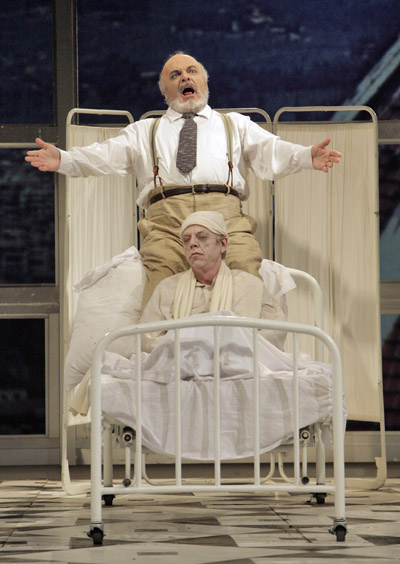A triptych of unusual dimensions
Having announced a season that looks predictable with safe and secure fare, San Francisco Opera is proving that it’s possible to breathe freshness into the tried and true by just tweaking things a bit. And by providing luscious singers who seem to have a bubbling-to-explosive chemistry between them.
For its second opera of the season the company presents Il Trittico, and, sure, it’s Puccini, he who hath composed three of opera’s most frequently mounted productions—La Bohème, Madam Butterfly and Tosca—but it’s one of his most unusual and infrequently presented works. It hasn’t been presented in its entirety at San Francisco Opera for 57 years. A startling fact, considering that Il Trittico premiered in 1918, less than a hundred years ago.
I love Puccini—his work moves definitively into the 20th century, musically and ethically—but there comes a time when seeing La Bohème one more time just doesn’t provide the thrill that opera strives for.
Il Trittico is an unusually formatted work—three one acts, each of which contains its own fascinating world conjured through music as well as story and setting. The current production, which was designed for the New York City Opera, shifts all of the one acts’ settings to mid-20th-century Europe. Originally, Suor Angelica was set in a 17th-century convent and Gianni Schichi in Dante’s late-13th-century Florence.
Soprano Patricia Racette takes on the formidable task of singing the three female leads: Giorgetta, the bereft and sensual wife who longs for home and love embodied in her husband’s workman Luigi; Suor Angelica, confined by her family in a convent for having had an illegitimate child and who also longs for home and her lost son; and Lauretta, the impish and nubile young daughter whose desire for happiness impels her roguish father to new heights (or is it depths?) of knavery and his comic defeat of human greed.
Racette is especially convincing in her more seductive roles, but her presentation of Suor Angelica was less so, not because of her voice but because of directorial choices that made her suicide less plausible. That self-murder is a mortal sin that condemns one to infinite Hell isn’t something that would be forgotten by the deeply Catholic. It can only be believable if the singer can project an instability close to madness, which is absent from her portrayal of the gentle Suor Angelica.
 The beauty of darkness
The beauty of darkness
Racette’s duet about their home, Belleville, with sultry and gorgeous tenor Brandon Jovanovich in Il Tabarro, was nostalgic, poignant and poised, characteristic of the composer’s use of lower voices to surround the soprano’s sound like black velvet offsetting the gleam of precious gems. David Lomeli sang the contrasting role of Lauretta’s lover Rinuccio—lilting and lovable—in Gianni Schichi.
The warmer and deeper voices that Puccini uses throughout the triptych is for me the heart of Il Trittico’s vocal beauty. Paolo Gavanelli’s full, rich baritone rose above the lush impressionistic score with formidable presence as Michele, Giorgetta’s husband, and bubbled over the chaotic voices of the dead Donati’s bickering relatives in his role as Gianni Schichi, Lauretta’s father.
Contralto Eva Podles, who has the most amazing voice in the infinitely dark and expanding universe, sang the Princess in Suor Angelica, a part of staggeringly cruel dimensions.
The supporting roles were sung wonderfully: bass Andrea Silvestrelli as Il Talpa in Il Tabarro and mezzo soprano Catherine Cook as La Frugola, among other roles. And the brilliant Adler Fellows comprised the rest of the huge cast, taking on multiple roles and being especially notable in their portrayals of the voracious Donati family.
Patrick Summers conducted the fine San Francisco Opera orchestra.
San Francisco Opera’s production of Puccini’s Il Trittico continues through October 3. For tickets and information, call 415-864-3330 or visit www.sfopera.com.
—Jaime Robles
Originally published in the Piedmont Post
Photo by Cory Weaver: Paolo Gavanelli sings Gianni Schichi
